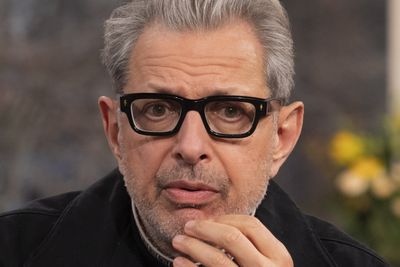In Defense of Jeff Goldblum's "Stupid" Islam Comments on "Drag Race"
Unlike most Americans, Jeff Goldblum had some humility on the issue
Actor Jeff Goldblum appeared as the guest judge on Friday night's episode of RuPaul's Drag Race and got himself into some hot water.
After Iranian-American contestant Jackie Cox walked the runway in a red and white striped kaftan with a blue hijab rimmed in stars—in keeping with the episode's "Stars and Stripes" theme—Goldblum asked her if she was religious. She responded that she is not but that her outfit "represents the importance that visibility for people of religious minorities need to have in this country."
She later got into how Donald Trump's controversial (and blatantly Islamophobic) travel ban had affected her personally, saying, "When the Muslim ban happened, it really destroyed a lot of my faith in this country. It really hurt my family … And I had to show America that you can be LGBT and from the Middle East, and there's gonna be complicated sh** around that, and that's okay. But I'm here, and I deserve to be in America just as much as anyone else."
It's a potent and important message in a time when xenophobia and exclusion are being promoted as the cure for all of America's problems, but that significance ended up being overshadowed by the outrage that erupted around Jeff Golblum's attempt to dig into some of that "complicated sh**." Noting what he referred to as "an interesting wrinkle," Goldblum asked, "Is there something in that religion that is anti-homosexuality and anti-woman? Does that complicate the issue? I'm just raising it and thinking out loud and maybe being stupid."
While RuPaul immediately brushed aside that bit of self-doubt, noting that "Drag has always shaken the tree, so to speak," it's important that Goldblum acknowledged his possible stupidity on the subject. The truth is that the vast majority of Americans are stupid when it comes to the topic of Islam—which is far from the monolithic system of oppression that Americans are encouraged to imagine. While some have criticized Goldblum's suggestion that Islam is particularly unfriendly toward women and the LBGTQ community as "dangerous," isn't there a danger in leaving commonly shared thoughts unspoken and uninterrogated?
As a nation, we've spent much of the last two decades being indoctrinated into a view of muslim countries as uniquely oppressive to the point that our military involvement in the region is justified and necessary. The truth is that misogyny and homophobia remain common to most cultures and religious institutions around the world, and the fact that America has legalized gay marriage and platformed a popular show about drag is hardly proof that we have moved past those problems ourselves. But while it would have been better for Jeff Goldblum to acknowledge that reality in his comments, that doesn't mean he's oblivious to it.
As it turns out, Goldblum has seen a lot of American homophobia. His older brother Lee was pushed into "conversion therapy" by their father, whom Goldblum describes as "conspicuously cruel" toward Lee, who has since passed away. All the while Lee's sexuality remained a secret, and it seems more than likely that the shame and trauma of those experiences contributed to Lee's later struggles with mental health. Some viewers have speculated that it was thoughts of his late brother that motivated Goldblum's tearful reception of the episode's lip-sync battle.
Regardless, it's safe to assume that Goldblum is aware of the homophobia that is still a big part of American culture and of most forms of religious belief. He has expressed broad criticism of organized religion in the past, and while Jackie Cox's outfit brought the topic to Islam, Goldblum might have asked the same sort of questions if a contestant from a Christian or Jewish background had dressed as a nun or a hasidic woman.
So while it's worth criticizing the islamophobia that can be inferred in Goldblum's comments, we can't jump at the chance to "cancel him." His perspective is likely more nuanced than a harsh interpretation would suggest, and the humility included in his note that he was "thinking out loud and maybe being stupid" deserves some credit.
Certainly criticism of Islam and Muslim-majority countries should be handled carefully and placed in a context that acknowledges the harm done to those cultures by American and European imperialism. But if we treat that criticism as inherently taboo and hateful, we give fodder to actual voices of hate to say that we are ignoring reality—the reality, for instance, that Iranian women are currently striving to improve with their headscarf protests.
For evidence, see the myriad "conservative" (white/Christian-supremacist) publications now rallying behind Jeff Goldblum as a supposed victim of cancel culture for calling out Muslim homophobia. Never mind that those same publications would never publish a tolerant word about a show like Ru Paul's Drag Race in any other context.
So yes, take Jeff Goldblum's slightly clueless perspective on Islam as an opportunity to educate and correct broader American ignorance, but leave outrage out of the equation—it doesn't help anything.
